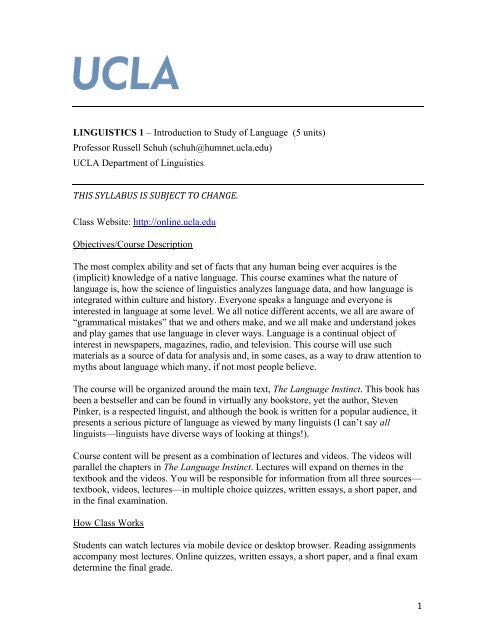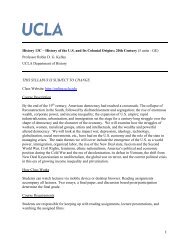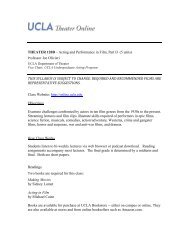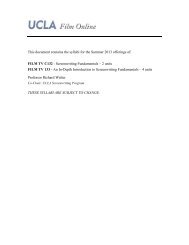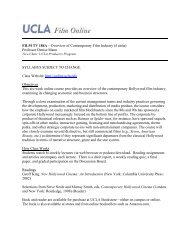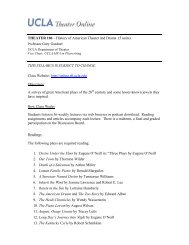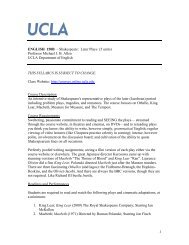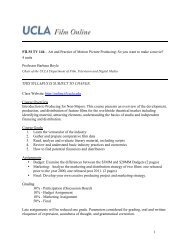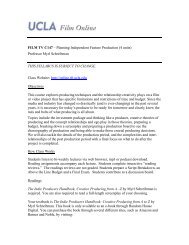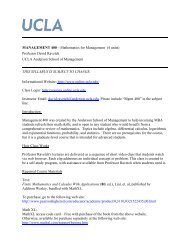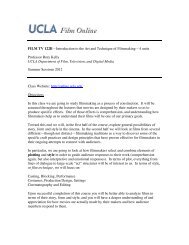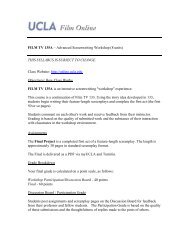course syllabus - UCLA Summer Sessions Online Courses
course syllabus - UCLA Summer Sessions Online Courses
course syllabus - UCLA Summer Sessions Online Courses
Create successful ePaper yourself
Turn your PDF publications into a flip-book with our unique Google optimized e-Paper software.
LINGUISTICS 1 – Introduction to Study of Language (5 units)<br />
Professor Russell Schuh (schuh@humnet.ucla.edu)<br />
<strong>UCLA</strong> Department of Linguistics<br />
THIS SYLLABUS IS SUBJECT TO CHANGE. <br />
Class Website: http://online.ucla.edu<br />
Objectives/Course Description<br />
The most complex ability and set of facts that any human being ever acquires is the<br />
(implicit) knowledge of a native language. This <strong>course</strong> examines what the nature of<br />
language is, how the science of linguistics analyzes language data, and how language is<br />
integrated within culture and history. Everyone speaks a language and everyone is<br />
interested in language at some level. We all notice different accents, we all are aware of<br />
“grammatical mistakes” that we and others make, and we all make and understand jokes<br />
and play games that use language in clever ways. Language is a continual object of<br />
interest in newspapers, magazines, radio, and television. This <strong>course</strong> will use such<br />
materials as a source of data for analysis and, in some cases, as a way to draw attention to<br />
myths about language which many, if not most people believe.<br />
The <strong>course</strong> will be organized around the main text, The Language Instinct. This book has<br />
been a bestseller and can be found in virtually any bookstore, yet the author, Steven<br />
Pinker, is a respected linguist, and although the book is written for a popular audience, it<br />
presents a serious picture of language as viewed by many linguists (I can’t say all<br />
linguists—linguists have diverse ways of looking at things!).<br />
Course content will be present as a combination of lectures and videos. The videos will<br />
parallel the chapters in The Language Instinct. Lectures will expand on themes in the<br />
textbook and the videos. You will be responsible for information from all three sources—<br />
textbook, videos, lectures—in multiple choice quizzes, written essays, a short paper, and<br />
in the final examination.<br />
How Class Works<br />
Students can watch lectures via mobile device or desktop browser. Reading assignments<br />
accompany most lectures. <strong>Online</strong> quizzes, written essays, a short paper, and a final exam<br />
determine the final grade.<br />
<br />
1
Required Texts<br />
1 – Course Reader, available for download from http://study.net<br />
This reader outlines all the lectures and includes discussion questions. In order for<br />
students to get the online <strong>course</strong> reader, they will have to go directly to http://study.net<br />
and register. As part of the registration process, students are asked to select a school.<br />
Choose University of California, Los Angeles. After registering, students will then be<br />
asked to choose the <strong>course</strong> they are taking – in this case, Linguistics 1. Please follow the<br />
additional steps on the site to purchase and download the <strong>course</strong> reader.<br />
2 – Steven Pinker, The Language Instinct, Harper Perennial, 1994. [Perennial Classics<br />
edition, 2000, 2007]<br />
The content of all these editions is identical. The page numbers in the 1994 edition are different from<br />
the pages in the 2000 and 2007 editions (the latter two are identical in all respects). Page numbers in<br />
the <strong>course</strong> <strong>syllabus</strong>, lecture notes, and assignments will refer to the 2000/2007 editions. You can use<br />
the 1994 edition as long as you are aware that you may need to look at pages different from those in<br />
the <strong>course</strong> materials.<br />
The Pinker book is available at the <strong>UCLA</strong> Bookstore, most large bookstores, and from<br />
online booksellers such as Amazon or Barnes & Noble.<br />
Screenings<br />
Required films/videos can be streamed from the class website.<br />
Assignments<br />
Quizzes: There will be an online quiz for each of the 11 lessons (Lessons 10 and 11 will<br />
be combined into a single quiz). Quizzes consist of 10 multiple choice, single correct<br />
answer questions. Quizzes become available on the <strong>course</strong> website on the Friday<br />
preceding the week when the relevant lessons are covered (Monday of the first week for<br />
Lesson 1) and are due by 11:59 pm PDT on the Sunday following the week for those<br />
lessons. If you do not submit a quiz within the given window, you will not receive credit<br />
for it. Once quizzes have been graded, an answer key will be posted. The three lowest<br />
quiz scores will be dropped in calculating the <strong>course</strong> grade (see below).<br />
Essays: An "Essay" in Linguistics 1 consists of two short answer questions related to an<br />
individual lesson. Responses to each question can be no longer than 150 words. A total of<br />
9 essays are assigned in weeks 1 through 5. None are assigned in week 6. The purpose of<br />
the essays is to allow students to succinctly demonstrate that they understand<br />
fundamental concepts. The lowest essay score is dropped when calculating your final<br />
grade. Week one's assignment can be downloaded on the first day of class. Subsequent<br />
assignments are available on Fridays. Assignments are due Sundays at 11:59 PDT.<br />
Assignments are submitted via Turnitin. Keys are posted when assignments are due.<br />
<br />
2
Paper: You will write a paper of 4-6 pages (typed, double spaced, 12-point type), due by<br />
Friday of the sixth week. The paper is to be submitted via Turnitin. See the class website<br />
for topic and instructions.<br />
Final Exam: The final exam is timed, multiple choice (80 questions), and cumulative for<br />
the entire <strong>course</strong>. It is an open book and open note exam and will be given the last day of<br />
class. The exam can be taken one of two ways: 1) on campus, proctored traditionally in a<br />
classroom, and 2) through ProctorU, a third-party service that allows students to take<br />
their exam at home through the use of a home computer with Internet connection and a<br />
webcam.<br />
The three-hour exam will be administered on campus on Friday, August 2 at an hour and<br />
in a room to be announced. Students who take the exam through ProctorU have three<br />
hours to complete the exam within a 24-hour window (to accommodate different time<br />
zones). The exam will be available through ProctorU beginning Friday, August 2 at 12:01<br />
am PDT and must be completed by 11:59 pm PDT. This means that students must start<br />
the exam by 8:59 pm PDT in order to meet the deadline.<br />
ProctorU charges $33.75, payable directly to that service prior to the start of the test.<br />
More information about ProctorU can be found at the end of this <strong>syllabus</strong> and also at:<br />
http://www.proctoru.com/<br />
TA Review <strong>Sessions</strong><br />
TA Review <strong>Sessions</strong> are one-hour, live meetings led by Teaching Assistants during<br />
which students have the opportunity to further review <strong>course</strong> material and to ask their<br />
TAs <strong>course</strong>-related questions.<br />
Review <strong>Sessions</strong> are conducted through the <strong>course</strong> website, and do not require students to<br />
purchase any special hardware or software. Teaching Assistants will appear by live video<br />
feed, and students will interact with them using text chat.<br />
There will be three Review Session opportunities each week for each TA on days/times<br />
listed on the class website. Students can choose to attend any number of sessions per<br />
week.<br />
Academic Integrity<br />
Any written assignment must be solely the work of the student who turns it in. Compiling<br />
a written assignment by pasting together extracts from websites is unacceptable and is a<br />
form of plagiarism. ALL WRITTEN WORK MUST BE SUBMITTED THROUGH<br />
TURNITIN. The <strong>course</strong> website will explain how to do this.<br />
<strong>UCLA</strong>’s policies on academic integrity and student conduct may be found at:<br />
http://www.studentgroups.ucla.edu/dos/students/integrity/<br />
http://www.studentgroups.ucla.edu/dos/students/conduct/<br />
<br />
3
Grade Breakdown<br />
Your final grade is calculated as follows:<br />
Total points % of grade<br />
Quizzes: 10 X 10 points each, lowest three scores dropped 70 points 25%<br />
Essays: X 9, lowest score dropped 80 points 25%<br />
Paper 40 points 20%<br />
Final Exam 80 points 30%<br />
<br />
4
SCHEDULE<br />
Note: Lecture videos and film/video screenings should be viewed in the order listed on<br />
this <strong>syllabus</strong>.<br />
Week One<br />
Lesson 1:<br />
Introduction<br />
Videos: Lecture: Introduction, Part 1<br />
Lecture: Introduction, Part 2<br />
Screening: Discovering the Human Language: Colorless Green Ideas<br />
(The Human Language Series #1)<br />
Reading: The Language Instinct, Chapters 1-3 (except pp. 64-69)<br />
Course Reader, pp. 9-23<br />
Quiz:<br />
Due Sunday at 11:59 pm PDT<br />
Essay: Covers Lesson 1; due Sunday at 11:59 pm PDT<br />
Week Two<br />
Lesson 2:<br />
Syntax<br />
Videos: Lecture: Syntax, Part 1<br />
Lecture: Syntax, Part 2<br />
Reading: The Language Instinct, Chapter 4<br />
Course Reader, pp. 25-33<br />
Quiz:<br />
Due Sunday at 11:59 pm PDT<br />
Lesson 3:<br />
Morphology<br />
Videos: Lecture: Morphology, Part 1<br />
Lecture: Morphology, Part 2<br />
Reading: The Language Instinct, Chapter 5<br />
Course Reader, pp. 37-45<br />
Quiz:<br />
Due Sunday at 11:59 pm PDT<br />
<br />
5
Essays: Cover Lessons 2-3; due Sunday at 11:59 pm PDT<br />
Week Three<br />
Lesson 4:<br />
Phonetics<br />
Videos: Lecture: Phonetics, Part 1<br />
Lecture: Phonetics, Part 2<br />
Reading: The Language Instinct, Chapter 6<br />
Course Reader, pp. 49-58<br />
Quiz:<br />
Due Sunday at 11:59 pm PDT<br />
Lesson 5:<br />
Videos:<br />
Change<br />
Screening: In Search of the First Language (Nova)<br />
Lecture: Change, Part 1<br />
Lecture: Change, Part 2<br />
Reading: The Language Instinct, Chapter 8 (skim pp. 232-241)<br />
Course Reader, pp. 63-78<br />
Quiz:<br />
Due Sunday at 11:59 pm PDT<br />
Essays: Cover Lessons 4-5; due Sunday at 11:59 pm PDT<br />
Week Four<br />
Lesson 6:<br />
Videos:<br />
Language Acquisition<br />
Screening: Acquiring the Human Language: Playing the Language<br />
Game (The Human Language Series #2)<br />
Lecture: Language Acquisition, Part 1<br />
Lecture: Language Acquisition, Part 2<br />
Reading: The Language Instinct, Chapter 9<br />
Course Reader, pp. 81-95<br />
Quiz:<br />
Due Sunday at 11:59 pm PDT<br />
<br />
6
Lesson 7:<br />
Language and the Brain<br />
Videos: Lecture: Language and the Brain, Part 1<br />
Lecture: Language and the Brain, Part 2<br />
Lecture: Language and the Brain, Part 3<br />
Optional Screening: The Mind: Language (outlined in Course Reader, pp. 99-104)<br />
Reading: The Language Instinct, Chapters 9-10 (skip pp. 324-333)<br />
Course Reader, pp. 99-117<br />
Quiz:<br />
Due Sunday at 11:59 pm PDT<br />
Essays: Cover Lessons 6-7; due Sunday at 11:59 pm PDT<br />
Week Five<br />
Lesson 8:<br />
Videos:<br />
Animal Communication and Comparison with Human<br />
Communication<br />
Screening: The First Signs of Washoe<br />
(outlined in Course Reader, pp. 123-128)<br />
Lecture: Animal Communication, Part 1<br />
Lecture: Animal Communication, Part 2<br />
Reading: The Language Instinct, Chapter 11 (pp. 340-351)<br />
Course Reader, pp. 123-133<br />
Quiz:<br />
Due Sunday at 11:59 pm PDT<br />
Lesson 9:<br />
The Origin of Language<br />
Videos: Lecture: The Origin of Language, Part 1<br />
Lecture: The Origin of Language, Part 2<br />
Reading: The Language Instinct, Chapter 11 (pp. 351-381)<br />
Course Reader, pp. 139-148<br />
Quiz:<br />
Due Sunday at 11:59 pm PDT<br />
<br />
7
Essays: Cover Lessons 8-9; due Sunday at 11:59 pm PDT<br />
Week Six<br />
Lesson 10:<br />
Videos:<br />
Prescriptive Grammar<br />
Lecture: Prescriptive Grammar<br />
Reading: The Language Instinct, Chapter 12<br />
Course Reader, pp. 153-158<br />
Lesson 11:<br />
Videos:<br />
Obscenity<br />
Lecture: Obscenity<br />
Screening: George Carlin, Seven Dirty Words You Can Never Say on<br />
Television<br />
Reading: The Language Instinct, Chapter 12<br />
Course Reader, pp. 165-167<br />
Quiz:<br />
Covers Lessons 10-11; due Friday at 6:00 pm PDT<br />
Paper:<br />
Due Friday at 6:00 pm PDT<br />
Final Exam:<br />
Covers all <strong>course</strong> content; available Friday at 12:01 am PDT and due at<br />
11:59 pm PDT. Once the exam is begun, it must be completed within a<br />
three-hour window.<br />
<br />
8
What We Do<br />
ProctorU is a revolutionary new service that allows students to complete<br />
their assessment at any location while still ensuring the academic<br />
integrity of the exam for the institution. Using almost any web cam and<br />
computer, you can take exams at home, at work, or anywhere you have<br />
internet access.<br />
Preparing for Your Exam<br />
You can take exams through ProctorU seven days a week. You will be connected to a live person during your<br />
exam that will be there to guide you through the process and assist with any technical problems. If you have<br />
any questions, please call our proctor line at 205-870-8122.<br />
Below is a quick list of procedures, followed by a more detailed explanation of the typical exam appointment.<br />
Student Checklist<br />
Your allotted exam time doesn’t begin until you are entered into the exam by your proctor.<br />
Have your student or government issued-ID ready, as you will have to show it to your<br />
proctor to verify your identity.<br />
ProctorU will run an applet, or temporary program on your computer that will allow us to<br />
view your screen and what programs are running during your exam session. This program<br />
will expire once you close it. Please close all unnecessary programs before logging in to<br />
ensure the best experience.<br />
Test your equipment at www.proctoru.com/testitout before your appointment to ensure<br />
everything works. Please see our technical requirements listed below.<br />
Make sure you have a fast and reliable internet connection. If you are connected through an<br />
intermittent WiFi connection, you may want to plug in directly to your modem, to avoid<br />
disconnecting during your exam. If you lose connectivity, please continue the test and email<br />
the <strong>course</strong> instructor immediately and call ProctorU at 205-870-8122.<br />
Please turn off all cell phones and find a comfortable, quiet spot in a well-lit room. Try to put<br />
light sources in front of you, such as windows or lamps, so they don’t cast shadows on your<br />
face. Your proctor will need a clear view of your surroundings and face in order to grant<br />
access to your exam.<br />
If your Learning Management System allows, please remember to save each answer as you<br />
go in case you lose connectivity or there is an error with the testing site.<br />
Some <strong>course</strong> instructors allow scrap paper and others do not. If scrap paper is allowed be<br />
prepared to show it to the proctor to ensure it is blank.<br />
Taking Your Exam<br />
ProctorU allows you to take your exam on demand or by appointment. All appointments should be made at<br />
least 3 days in advance. To make an appointment, simply create an account at http://go.proctoru.com, or<br />
your school’s ProctorU web portal, then log in, click on the “new exam” link and select the exam, date, and<br />
time you desire. You will receive a confirmation email of your reservation at the email address that you<br />
provided to ProctorU. Reservations made within 72 hours of your exam are subject to a $5 late reservation<br />
fee. Students without an appointment can take their exam on demand within 15, 30 or 45 minutes utilizing<br />
“Take it Now”. This premiere feature is designed to give test takers added convenience and only costs $8.75.<br />
Late registrations and “Take it Now” are subject to availability.<br />
www.ProctorU.com<br />
Real People. Real Proctoring.
Procedure<br />
Plan ahead for your session. Make sure you have a quiet, private location in which to take the test.<br />
The area and room around your computer will be scanned using a web cam prior to your exam, so all<br />
non-authorized materials should be put away and the area should be clutter-free. If you are using a<br />
public computer lab, you must have a web cam connection and use headphones, so you won’t disturb<br />
others. You will also be required to show picture identification to your proctor at the time of your<br />
exam. Approved forms of identification include, but are not limited to, a driver’s license, military<br />
identification card, passport, or school-issued identification card. No breaks are allowed during your<br />
testing session and cell phones and other devices will not be permitted in the testing area. No other<br />
people are allowed in the area in which the test is being taken. Any unauthorized notes or other<br />
attempts to cheat will abort the test session and will be reported to your instructor.<br />
At the date and time of your appointment, return to http://go.proctoru.com, log in, and a message<br />
will appear saying, “You have an exam. Click here to begin.” Click on this button and it will<br />
automatically take you to the proctor page. Fill out your personal information and hit submit. You<br />
will then be directed to a screen which will connect you to your proctor. Just follow the steps on the<br />
screen and a proctor will be connected with you shortly.<br />
Once connected, your designated proctor will walk you through the set up process and you will log<br />
into your testing portal. Your proctor will also supply the password for your examination. Your exam<br />
time will begin when the proctor enters the examination password on your screen. If you have any<br />
problems connecting, please call ProctorU at 205-870-8122.<br />
Technical Requirements<br />
Students are responsible for meeting the following technical requirements:<br />
A reliable computer running Windows XP (or higher) or Mac OS X 10 (or higher).<br />
A web cam with 640x480 video pixel resolution or higher.<br />
Headphones or working speakers connected to the computer.<br />
A working microphone connected to the computer. We recommend a web cam that has a built in<br />
microphone.<br />
A web browser with Adobe Flash Player installed. We recommend Flash Player 11.<br />
A reliable, high-speed internet connection.<br />
The ability to allow video and screen-sharing connections to the computer you will be using to take your<br />
exam.<br />
Students can test their computer, web cam, and internet connection at www.ProctorU.com/Testitout.<br />
Contact Us<br />
To learn more about ProctorU, please visit our website at www.ProctorU.com<br />
Don’t forget to “like” us on Facebook and follow us on Twitter!<br />
www.facebook.com/ProctorU<br />
http://twitter.com/ProctorU<br />
www.ProctorU.com<br />
Real People. Real Proctoring.


